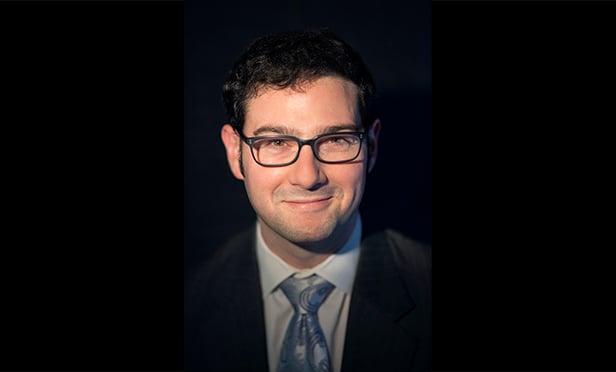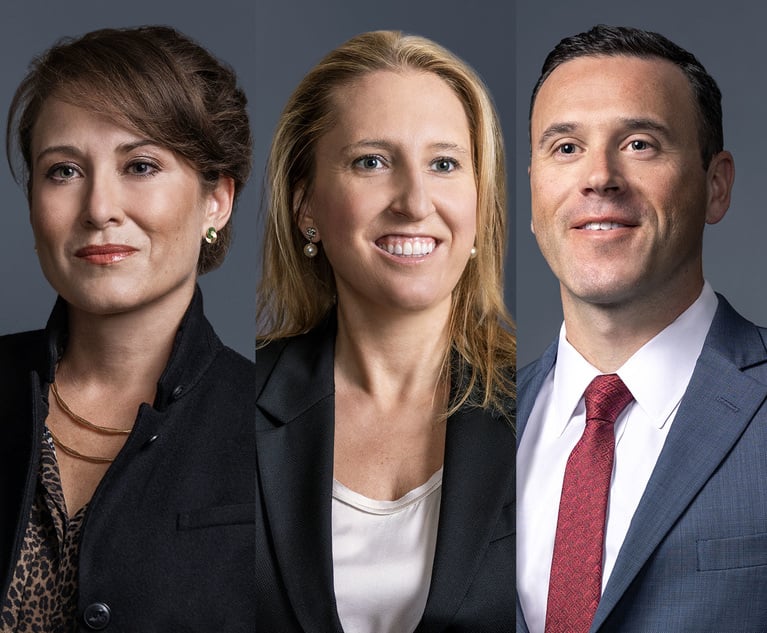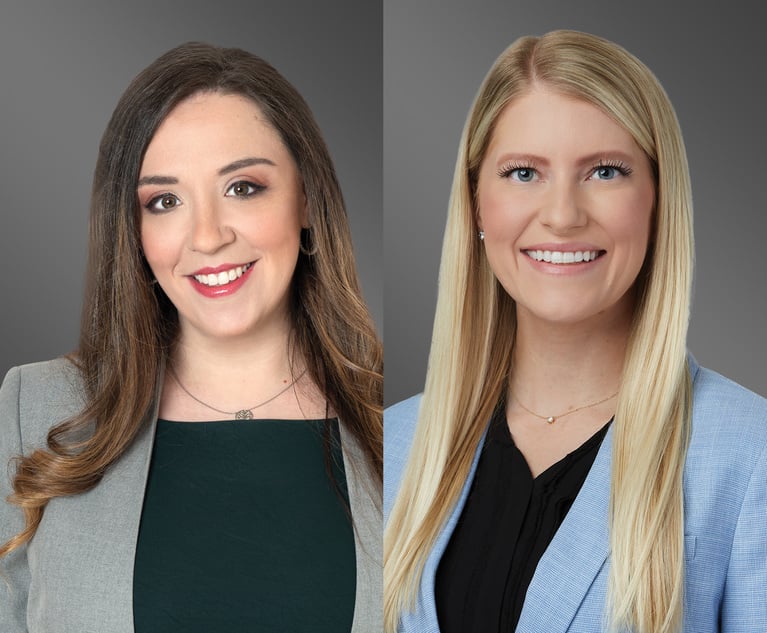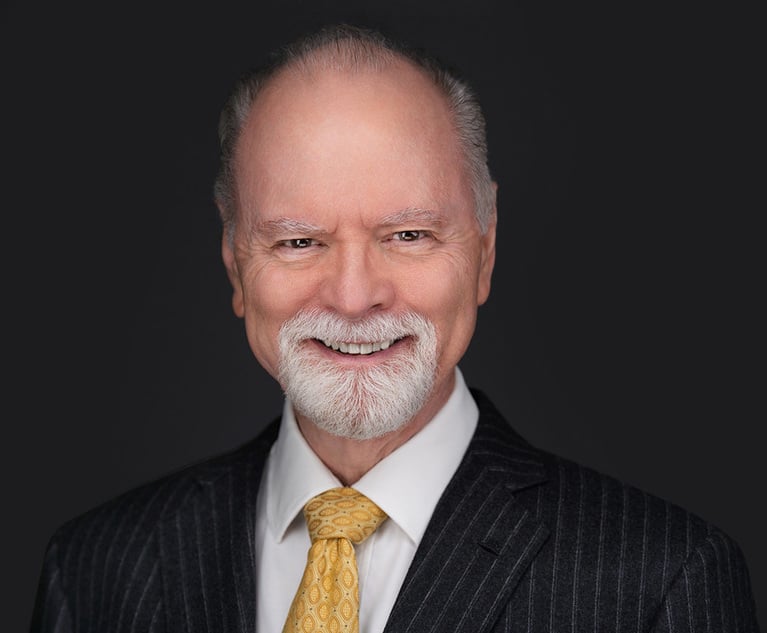On Appeals: 20 Years On, California Supreme Court's Federal Certification Rule a Success
In 1998, a fashionably late California joined 44 states in adopting a procedure to allow out-of-state courts to request the state supreme court decide unsettled questions of state law relevant to their ongoing proceedings. Primarily aimed at federal courts, which frequently hear state law claims under their diversity jurisdiction, the rule was controversial and faced stiff resistance at the outset. But now, two decades on, it's turned out a great success.
September 26, 2018 at 03:42 PM
8 minute read
 Ben Feuer, California Appellate Law Group
Ben Feuer, California Appellate Law Group
In 1998, a fashionably late California joined 44 states in adopting a procedure to allow out-of-state courts to request the state supreme court decide unsettled questions of state law relevant to their ongoing proceedings. Primarily aimed at federal courts, which frequently hear state law claims under their diversity jurisdiction, the rule was controversial and faced stiff resistance at the outset. But now, two decades on, it's turned out a great success.
It was a much longed-for rule. Other states' last-resort tribunals had been taking federal referrals since the 1940s, and the practice became a kind of cause célèbre in the 1970s, with express endorsements from institutions from the American Bar Association to the legal academy to the U.S. Supreme Court. By the 1980s and 1990s, the Ninth Circuit began to publicly complain about California's sideline status; while the circuit's other states had referral rules, California makes up nearly half the circuit caseload, so the absence was tangible.
The idea of federal courts referring state law issues to state supreme courts is an artifact of America's unique federalist structure. When federal courts hear diversity cases, the Erie doctrine generally requires them to apply the relevant state's substantive law as they think it would be applied by the state's supreme court. But sometimes, it's far from clear what that substantive law is or how it should be interpreted, meaning federal courts don't always get it right. Not only do they want to get it right, but wrongly decided federal precedent can tie other federal courts down and work injustices even after the state courts have clarified a different rule.
Today, California Rule of Court 8.548 provides a formal request process by which a federal court faced with a decision that hinges on California law can ask the California Supreme Court to decide the issue. It must be one without clear California precedent, and the request must be framed as a question. While the original rule required the request to be stamped with a “certified” seal by the federal court—hence the “certification” moniker applied to the procedure—the rule has since been revised to operate off any order issued by a foreign court.
Concerned with finding its own docket overwhelmed by requests, the Supreme Court put limits on the rule. Unlike most other states, California permits requests to be made by federal courts of appeals but not federal district courts. It also requires at least four justices to vote to take a request from a foreign court.
With an eye to avoiding overstepping its welcome, the Ninth Circuit has also adopted its own limits on when it can certify a question to a state supreme court. In a 2003 opinion, Kremen v. Cohen, the court held that a certified question must be a one of “significant precedential and public policy importance” that is genuinely ambiguous under state law, and the court should not generally use the mechanism to dodge Erie's command to interpret and apply state law itself. A separate opinion by then-Judge Alex Kozinski explained that the overriding principle behind certifying questions to a state court is comity, and given the hard work and time required to decide certified questions, the Ninth Circuit should take care not to waste other courts' indulgence with questions it can figure out on its own.
In the intervening two decades, both sides have largely played ball. The Ninth Circuit has taken care to respect the California Supreme Court's time, and the court hasn't hesitated to rebuff a certified question when it's found the issue already resolved by precedent or insufficiently important. For the most part, the procedure has allowed California the first crack at resolving important ambiguities and uncertainties in its own regulations. After all, a state's authority to interpret its own law is at the core of its sovereignty.
The best evidence of how well the procedure is working is in how much the courts are using it. In the first decade or so after the rule was passed, the Supreme Court took an average of two certification requests from the Ninth Circuit each year. In the second decade, that number has almost doubled to an average of nearly four per year. Thus far in 2018, the court has already granted five requests from the Ninth Circuit, denied two, and at least one is currently pending—with nearly a quarter of the year left.
Litigation Strategy in the Ninth Circuit
For litigants, the courts' embrace of the certification process adds additional strategic considerations. While the Ninth Circuit often decides to refer cases to the California Supreme Court on its own, the parties to an appeal may file a motion asking the court to request the California Supreme Court review certain issues or ask the court to do so in their principal briefs on appeal. If you learn you've drawn a Ninth Circuit panel with a more conservative set of judges but you're hoping for a left-leaning outcome, the California Supreme Court's more progressive composition may mean a better result could come from that court than the federal panel.
Additionally, at least one Ninth Circuit ruling suggests the court will consider referring questions to the California Supreme Court even where federal precedent exists and no intervening state court decisions have called it into question. In 2016's Troester v. Starbucks Corp., the court referred a question to the California Supreme Court even though a previous panel had interpreted the California legal issue a few months earlier. The Troester panel didn't explain its decision, other than to identify the prior ruling as dicta—but the court's precedential application of “well-reasoned dicta” makes that distinction puzzling. In reality, elevation of federalism principles in recent years may better explain why the Ninth Circuit wants to be as sure as possible it's applying California law in the way California would.
But if you want the Ninth Circuit to consider referring your case, you need to ask for that relief reasonably early and in good faith. Courts hate forum shopping, and that's one reason it may be difficult to seek a referral strategically after you know your who's on your panel. Panel composition is usually secret until a week before oral argument, and by then, you've probably missed your shot. Only if the panel seems confused about the state of California law at argument should you consider moving for referral afterward, and you should make it clear that the judges' confusion is what prompted the motion. In a scalding opinion from 2013, Hinojos v. Kohl's Corporation, the court excoriated Kohl's counsel for moving to refer a state law claim to the California Supreme Court only after it became clear at oral argument that the court found California law clear and they were likely to lose.
Litigation Strategy in the California Supreme Court
Getting the Ninth Circuit on board is only half the battle, of course; the Supreme Court has to agree to take the request. Parties and nonparties with an interest in the outcome can file letter briefs within 20 days of a Ninth Circuit referral order that encourages the court to accept or reject the request, or even to rephrase the question to be decided. As with any California Supreme Court decision to grant review, the issue needs to be one of statewide importance or where lower courts have split, and the law must indeed be unclear.
Litigants on both sides are well-advised to seek amicus support for this stage of the process. An upshot is that if the court grants the request, those amici may already be primed to participate in the merits briefing process, which will proceed much as it does with any other case in that court.
Thus, the lesson for counsel with diversity appeals involving California law is to ensure they always evaluate the potential for requesting referral to the California Supreme Court at the outset. Given how well the certification rule has worked in the past two decades—and especially if California law is genuinely ambiguous—the courts may be inclined to seriously consider the request.
On Appeals is a monthly column by the attorneys of the California Appellate Law Group, an appellate boutique with offices in San Francisco and Los Angeles. Ben Feuer is the chairman of the firm. He handles civil and business appeals in the federal and state appellate courts. You can email him at [email protected] or find him at www.calapplaw.com.
This content has been archived. It is available through our partners, LexisNexis® and Bloomberg Law.
To view this content, please continue to their sites.
Not a Lexis Subscriber?
Subscribe Now
Not a Bloomberg Law Subscriber?
Subscribe Now
NOT FOR REPRINT
© 2025 ALM Global, LLC, All Rights Reserved. Request academic re-use from www.copyright.com. All other uses, submit a request to [email protected]. For more information visit Asset & Logo Licensing.
You Might Like
View All
M&A Transactions and AB 1824: Navigating New Privacy Compliance Challenges
7 minute read
What Will It Mean in California if New Federal Anti-SLAPP Legislation Passes?
9 minute readTrending Stories
- 1Uber Files RICO Suit Against Plaintiff-Side Firms Alleging Fraudulent Injury Claims
- 2The Law Firm Disrupted: Scrutinizing the Elephant More Than the Mouse
- 3Inherent Diminished Value Damages Unavailable to 3rd-Party Claimants, Court Says
- 4Pa. Defense Firm Sued by Client Over Ex-Eagles Player's $43.5M Med Mal Win
- 5Losses Mount at Morris Manning, but Departing Ex-Chair Stays Bullish About His Old Firm's Future
Who Got The Work
J. Brugh Lower of Gibbons has entered an appearance for industrial equipment supplier Devco Corporation in a pending trademark infringement lawsuit. The suit, accusing the defendant of selling knock-off Graco products, was filed Dec. 18 in New Jersey District Court by Rivkin Radler on behalf of Graco Inc. and Graco Minnesota. The case, assigned to U.S. District Judge Zahid N. Quraishi, is 3:24-cv-11294, Graco Inc. et al v. Devco Corporation.
Who Got The Work
Rebecca Maller-Stein and Kent A. Yalowitz of Arnold & Porter Kaye Scholer have entered their appearances for Hanaco Venture Capital and its executives, Lior Prosor and David Frankel, in a pending securities lawsuit. The action, filed on Dec. 24 in New York Southern District Court by Zell, Aron & Co. on behalf of Goldeneye Advisors, accuses the defendants of negligently and fraudulently managing the plaintiff's $1 million investment. The case, assigned to U.S. District Judge Vernon S. Broderick, is 1:24-cv-09918, Goldeneye Advisors, LLC v. Hanaco Venture Capital, Ltd. et al.
Who Got The Work
Attorneys from A&O Shearman has stepped in as defense counsel for Toronto-Dominion Bank and other defendants in a pending securities class action. The suit, filed Dec. 11 in New York Southern District Court by Bleichmar Fonti & Auld, accuses the defendants of concealing the bank's 'pervasive' deficiencies in regards to its compliance with the Bank Secrecy Act and the quality of its anti-money laundering controls. The case, assigned to U.S. District Judge Arun Subramanian, is 1:24-cv-09445, Gonzalez v. The Toronto-Dominion Bank et al.
Who Got The Work
Crown Castle International, a Pennsylvania company providing shared communications infrastructure, has turned to Luke D. Wolf of Gordon Rees Scully Mansukhani to fend off a pending breach-of-contract lawsuit. The court action, filed Nov. 25 in Michigan Eastern District Court by Hooper Hathaway PC on behalf of The Town Residences LLC, accuses Crown Castle of failing to transfer approximately $30,000 in utility payments from T-Mobile in breach of a roof-top lease and assignment agreement. The case, assigned to U.S. District Judge Susan K. Declercq, is 2:24-cv-13131, The Town Residences LLC v. T-Mobile US, Inc. et al.
Who Got The Work
Wilfred P. Coronato and Daniel M. Schwartz of McCarter & English have stepped in as defense counsel to Electrolux Home Products Inc. in a pending product liability lawsuit. The court action, filed Nov. 26 in New York Eastern District Court by Poulos Lopiccolo PC and Nagel Rice LLP on behalf of David Stern, alleges that the defendant's refrigerators’ drawers and shelving repeatedly break and fall apart within months after purchase. The case, assigned to U.S. District Judge Joan M. Azrack, is 2:24-cv-08204, Stern v. Electrolux Home Products, Inc.
Featured Firms
Law Offices of Gary Martin Hays & Associates, P.C.
(470) 294-1674
Law Offices of Mark E. Salomone
(857) 444-6468
Smith & Hassler
(713) 739-1250








